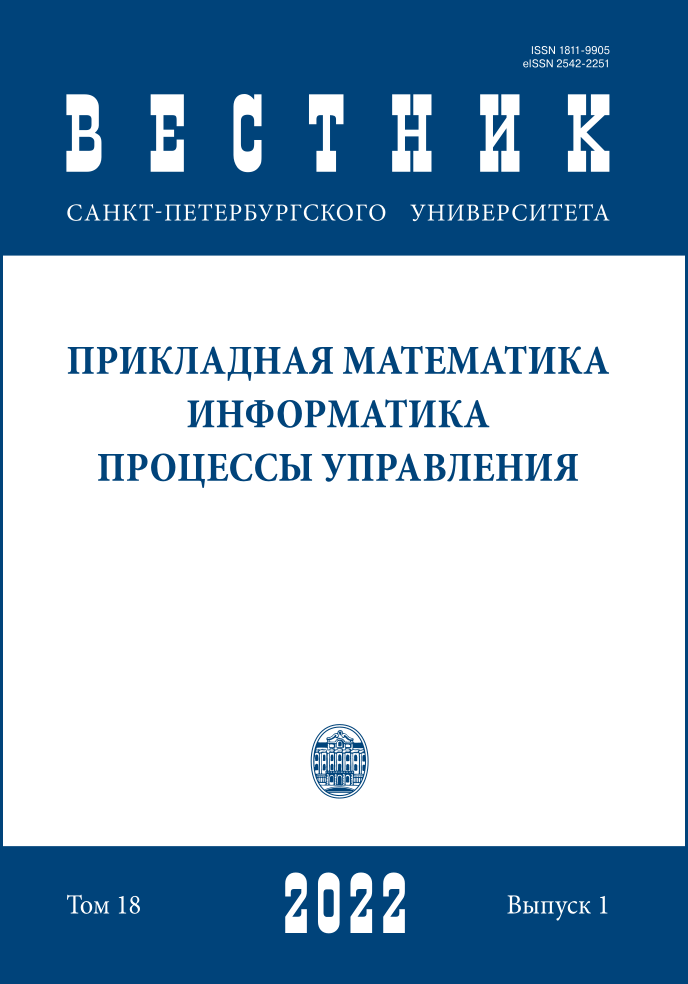Two-stage network games modeling the Belt and Road Initiative
DOI:
https://doi.org/10.21638/11701/spbu10.2022.107Abstract
Inspired by the Belt and Road Initiative, we introduce a model of two-stage network games, when players first form a directed network (the first stage) and then they may reconsider the actions made at the first stage and choose controls to influence other players in a positive or negative way (the second stage). At both stages players get their payoffs. Considering a cooperative version of the game, we examine the problem of subgame network consistency and design an imputation distribution procedure as a new system of stage payments to guarantee the long-term cooperation. The Shapley value with exogenous directed graph constraint is used as a cooperative solution concept. Finally, we prove that a cooperative subgame is convex which ensures the non-emptiness of the core.
Keywords:
network games, subgame consistency, imputation distribution procedure, the Shapley value, directed graph, convex game
Downloads
References
Bandiera L., Tsiropoulos V. A framework to assess debt sustainability under the Belt and Road Initiative. Journal of Development Economics, 2020, vol. 146, no. 102495.
Lall S. V., Lebrand M. Who wins, who loses? Understanding the spatially differentiated effects of the belt and road initiative. Journal of Development Economics, 2020, vol. 146, no. 102496.
Petrosyan L. A. Ustojchivost' reshenij v differencial'nyh igrah so mnogimi uchastnikami [Stability of solutions in differential games with many participants]. Vestnik of Leningrad University, 1977, no. 19, pp. 46–52. (In Russian)
Sedakov A. A., Zhen M. Opinion dynamics game in a social network with two influence nodes. Vestnik of Saint Petersburg University. Applied Mathematics. Computer Science. Control Processes, 2019, vol. 15, iss. 1, pp. 118–125. https://doi.org/10.21638/11702/spbu10.2019.109
Bala V., Goyal S. A noncooperative model of network formation. Econometrica, 2000, vol. 68, iss. 5, pp. 1181–1229.
Jackson M. O., Watts A. On the formation of interaction networks in social coordination games. Games and Economic Behavior, 2002, vol. 41, iss. 2, pp. 265–291.
Song Y., van der Schaar M. Dynamic network formation with incomplete information. Economic Theory, 2015, vol. 59, iss. 2, pp. 301–331.
Atabati O., Farzad B. A strategic model for network formation. Computational Social Networks, 2015, vol. 2, iss. 1, pp. 1–14.
Avrachenkov K., Elias J., Martignon F., Petrosyan L. A. A Nash bargaining solution for cooperative network formation games. Networking, 2011, vol. 6640, pp. 307–318.
Petrosyan L. A., Sedakov A. A. Multistage network games with perfect information. Automation and Remote Control, 2014, vol. 75, iss. 8, pp. 1532–1540.
Petrosyan L. A., Danilov N. N. Ustojchivye reshenija neantagonisticheskih differencial'nyh igr s tranzitivnymi vyigryshami [Stability of solutions in non-zero sum differential games with transferable payoffs]. Vestnik of Leningrad University, 1979, no. 1, pp. 52–59. (In Russian)
Gao H., Petrosyan L. A., Qiao H., Sedakov A. Cooperation in two-stage games on undirected networks. Journal of Systems Science and Complexity, 2017, vol. 30, iss. 3, pp. 680–693.
Pankratova Y. B., Petrosyan L. A. New characteristic function for multistage dynamic games. Vestnik of Saint Petersburg University. Applied Mathematics. Computer Science. Control Processes, 2018, vol. 14, iss. 4, pp. 316–324. https://doi.org/10.21638/11701/spbu10.2018.404
Sun P., Parilina E. M. Stochastic model of network formation with asymmetric players. Automation and Remote Control, 2021, vol. 82, iss. 6, pp. 1065–1082.
Khmelnitskaya A., Selçuk Ö., Talman D. The Shapley value for directed graph games. Operations Research Letters, 2016, vol. 44, iss. 1, pp. 143–147.
Gillies D. Some theorems on n-person games. PhD Dissertation. Princeton, Princeton University Press, 1953, 31 p.
Shapley L. S. Cores of convex games. International Journal of Game Theory, 1971, vol. 1, iss. 1, pp. 11–26.
Sun P., Parilina E. Network formation with asymmetric players and chance moves. Mathematics, 2021, vol. 9, no. 814.
Downloads
Published
How to Cite
Issue
Section
License
Articles of "Vestnik of Saint Petersburg University. Applied Mathematics. Computer Science. Control Processes" are open access distributed under the terms of the License Agreement with Saint Petersburg State University, which permits to the authors unrestricted distribution and self-archiving free of charge.





